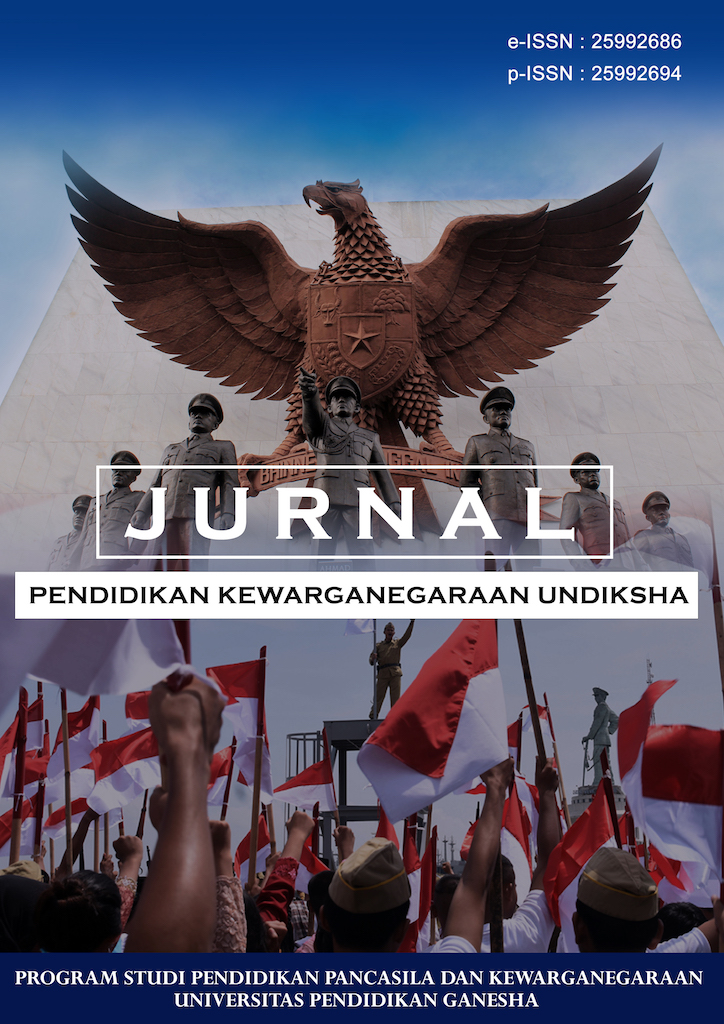Penerapan Model Pembelajaran Debat Untuk Meningkatkan Keterampilan Berdemokrasi Pada Pelajaran PPKn Siswa Kelas XI IBB4 SMA Negeri 3 Singaraja Tahun 2016/2017
DOI:
https://doi.org/10.23887/jpku.v3i3.20832Abstract
ABSTRAK
Penelitian ini bertujuan untuk mengetahui penerapan model pembelajaran debat untuk meningkatkan keterampilan berdemokrasi pada pelajaran PPKn siswa kelas XI IBB4 SMA Negeri 3 Singaraja tahun 2016/2017. Penelitian ini merupakan penelitian tindakan kelas. Subjek penelitian ini adalah siswa kelas XI IBB4 SMA Negeri 3 Singaraja pada semester II tahun ajaran 2016/2017 yang berjumlah 32 orang siswa. Objek penelitian ini meliputi keterampilan berdemokrasi siswa dan prestasi belajar siswa. Data penelitian dikumpulkan dengan menggunakan metode observasi dan metode wawancara
Data yang telah terkumpul dianalisis menggunakan metode deskriptif kualitatif. Hasil analisis data menunjukan bahwa nilai rata-rata keterampilan berdemokrasi siswa pada siklus I yaitu dari 70,43 dengan kategori sedang, pada siklus II meningkat menjadi 80,26 dengan kategori tinggi. Sedangkan nilai rata-rata prestasi belajar siswa pada siklus I yaitu dari 68,13 dengan kategori cukup, ketuntasan secara klasikal sebesar 40,62% menjadi 80,18 dengan kategori baik, ketuntasan secara klasikal mencapai 90,62% pada siklus II.
Sehingga keterampilan berdemokrasi siswa dari siklus I ke siklus II mengalami peningkatan yang cukup tinggi yaitu sebesar 9,83. Sedangkan prestasi belajar siswa juga mengalami peningkatan yaitu mencapai 12,05. Jadi dapat disimpulkan bahwa penerapan model pembelajaran debat dapat meningkatkan keterampilan berdemokrasi siswa kelas XI IBB4 SMA Negeri 3 Singaraja.
Kata-kata kunci: model pembelajaran debat, keterampilan berdemokrasi dan prestasi belajar
An Application of Debate Learning Model to Improve Democracy Skill on PPKnLesson on Students at Class XI IBB4 SMA Negeri 3 Singaraja Academic Year 2016/2017
ABSTRACT
The aim of this study is to find out the application of debate learning model to improve democracy skills on PPKn lesson on students at XI IBB4 SMA Negeri 3 Singaraja academic year 2016/2017. This study is a classroom action research. The subjects of this study were the students at XI IBB4 SMA Negeri 3 Singaraja in the second semester of academic year 2016/2017, which consist of 32 students. The objects of this study include students' democracy skills and student’s achievement. The data was collected by using observation and interview methods.
The data which have been collected were analyzed using descriptivequalitative technique. The result of data analysis shows that there is an increasing of democracy skill of students from 70,43 it’s categorized as midle category in cycle I to 80,26 it’s categorized as good category in cycle II. While the students' learning achievement also experienced an increasing in the average score of students’achievement from 68.13 with the classical completeness of 40.62% in the first cycle to 80.18 with 90.62% classical completeness in cycle II.
So the democracy skill from the student in cycle I to cycle there is an significant increasing that is 9,83, while the students’ learning achievsment also expereneed am incrising score to 12,05. So that the application of debate learning model can improve the democracy skills of students of grade XI IBB4 SMA Negeri 3 Singaraja.
Keywords: Debate learning model, democracy skill dan students learning achievement
Downloads
Published
Issue
Section
License
Authors who publish with the Jurnal Pendidikan Kewarganegaraan Undiksha agree to the following terms:
- Authors retain copyright and grant the journal the right of first publication with the work simultaneously licensed under a Creative Commons Attribution License (CC BY-SA 4.0) that allows others to share the work with an acknowledgment of the work's authorship and initial publication in this journal.
- Authors are able to enter into separate, additional contractual arrangements for the non-exclusive distribution of the journal's published version of the work (e.g., post it to an institutional repository or publish it in a book), with an acknowledgment of its initial publication in this journal.
- Authors are permitted and encouraged to post their work online (e.g., in institutional repositories or on their website) prior to and during the submission process, as it can lead to productive exchanges, as well as earlier and greater citation of published work. (See The Effect of Open Access)










